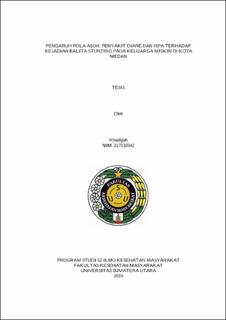| dc.description.abstract | Stunting is a long-term reflection of inadequate quality and quantity of food and frequent infections during childhood, especially in low (poor) family economic con- ditions. This study aims to analyze the influence of parenting patterns (giving breast milk and MP ASI, food preparation , environmental hygiene and sanitation prac- tices, caring for children when sick), diarrheal infectious diseases and ISPA on the incidence of stunting under five in poor families in Medan City. This research method uses a case control approach. The sample was 105 children from poor fam- ilies by making a comparison between the number of samples in the case group and the control sample of 35 samples in the case group and 70 in the control group. The sampling technique was carried out using the cluster sampling method. Data taken regarding breast milk and complementary foods, food preparation and storage, hy- giene and sanitation practices, child care were obtained through questionnaires. The incidence of child stunting was obtained from the results of measuring the child's height using a toddler height measuring instrument. Data collection uses primary data through questionnaires and secondary data through data from chil- dren's KIA books, the Health Office, Social Services. The results of the research show that there is a significant relationship between breast milk and MP ASI (p- value 0.006) and environmental sanitation hygiene practices (p-value = 0.017) on the incidence of stunting in toddlers from poor families In conclusion parenting patterns of providing breast milk and MP ASI, cleanliness and environmental san- itation practices do not have a good effect on the incidence of stunting in toddlers from poor families in Medan City. | en_US |


